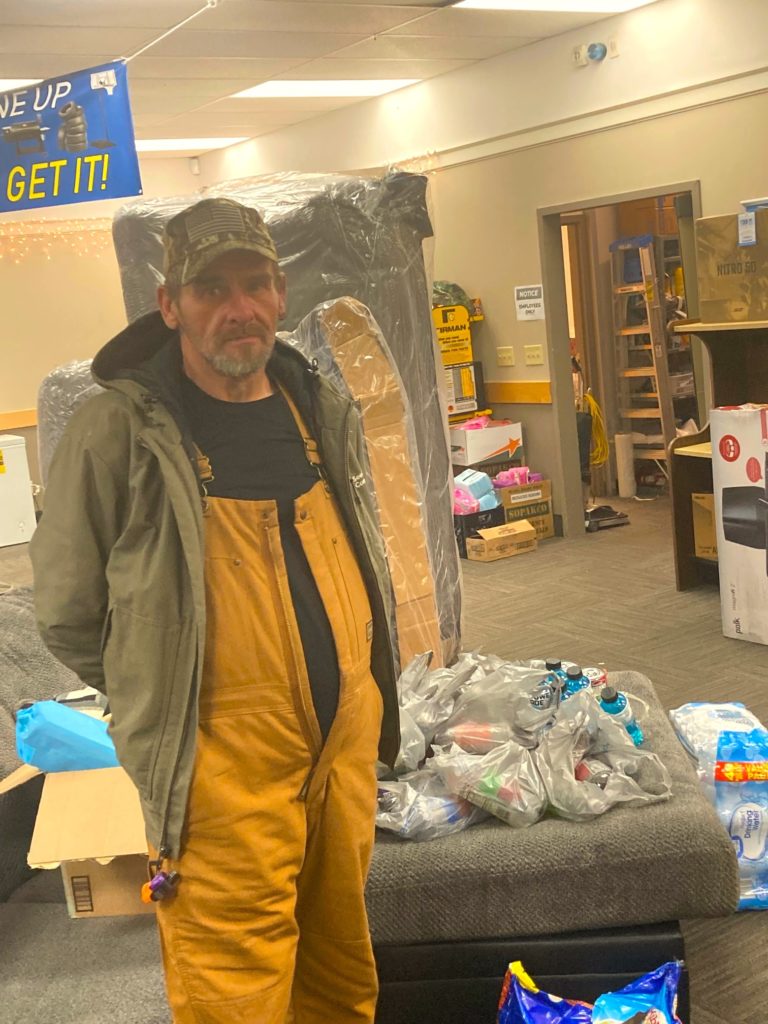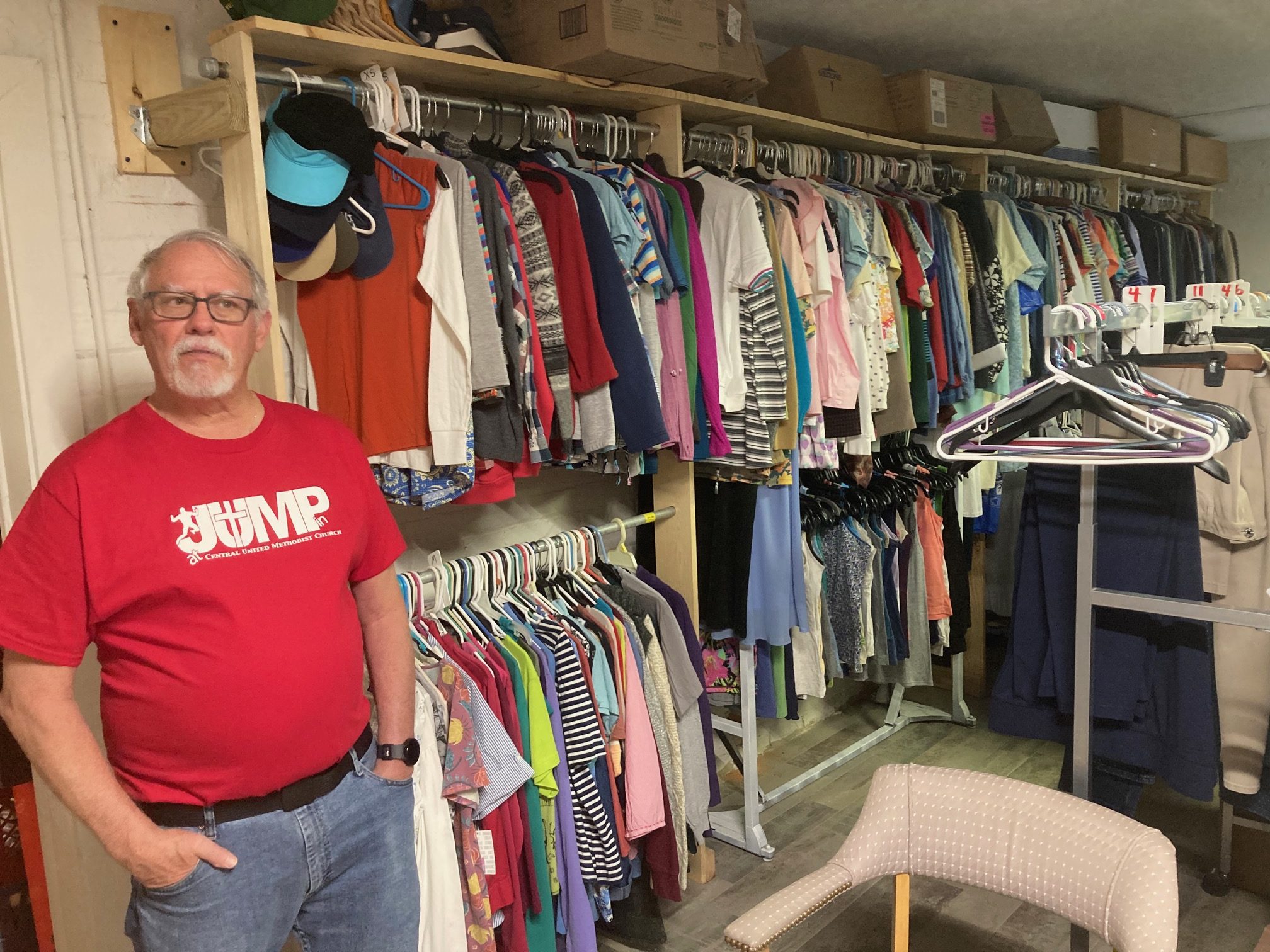Count volunteers have a good day, finding many of the largely unseen among us
Among the people without homes who came into a Richmond church for lunch last Wednesday is one who says he needs an official identification card to get a job. But to get an ID, he needs a birth certificate from his home state and says he doesn’t have the money needed to get that.
James Lineberry, known as Tennessee because that’s where he grew up, has been living in Richmond for about two years. We spoke on Jan. 12, nearly two weeks before the Point In Time homeless count where we met again at Central United Methodist Church in Richmond. Volunteers at the church last Wednesday provided lunch for a crowd of people without homes. Several social service agencies were on hand to connect people with services and bags of supplies.
Point In Time is a national effort to count as many people experiencing homelessness as possible, all on the same day. The federal government uses the numbers to help allocate money for programs that help homeless people. Centerstone, a health care agency, coordinates the local effort.
Donielle R. Harleman, the count’s regional chairwoman, reported, “The PIT count went very well. Many volunteers stepped in and provided their time with the event.”
She could not provide a number of local homeless people counted until after reviewing surveys taken that day. But, “Central United Methodist mentioned over 100 people during the hours of the luncheon, completing the surveys.”
In 2022, the PIT count found 42 homeless people in Richmond. Local agencies and social workers believe the actual count is much higher but finding people without homes is difficult.
Point In Time volunteers visited “under bridges, woods behind Tractor Supply Company, Cardinal Greenway, graveyards, abandoned structures including houses, Hope House, A Better Way, the parks, parking lots of stores, gas stations, the Gorge, north side railroad tracks, J Street bridge, alleys,” Harleman said. “We had teams at various locations that swooped the areas during the early mornings and evenings.”
Tennessee had helped Point In Time by spreading the word about the survey’s importance and about activities at the church. “I brought several of them in,” Tennessee said. “I know where a lot of them live.”
More than 35 other volunteers assisted. Programs along with Central Methodist that offered services were Centerstone, Meridian, A Better Way, Neighborhood Health Center, Choices, Purdue Extension, Reid Health, New Testament Church of Christ in Hagerstown, Cambridge City Christian Church, Centerville United Methodist Church, Fountain City Lions Club, Richmond First United Methodist, Unveiled Church, Natco Credit Union, People of the Streets Richmond Chapter and Rose Coalition of Wayne County.
Laurie Dickson is among Tennessee’s friends. She is manager of the east side Rent-A-Center store where Tennessee is a frequent visitor. The store is a collection point for supplies that local people donate for the use of people without homes. She said Tennessee is a volunteer worker there.

On the first day we spoke, Tennessee wore a set of Carhartt-style insulated coveralls, a warm shirt, new leather boots and a warm jacket. He rode in from his shelter on a shiny bike.
“I find stuff in the garbage all the time,” he said. “The night before last, I was digging through the dumpster and found a brand-new pair of tennis shoes.”
Sometimes he sells some of what he finds, getting a bit of money to spend on food or other necessities. “If I find toys and stuff, I give it to kids. I found two Cabbage Patch dolls, the old original ones, and gave them to a little girl. You should have seen her face light up.”
It pleased him that someone had bought a stove for him.
“I was standing there in Walmart looking at this Coleman one-burner thing and a guy said he’d take care of it for me,” Tennessee said. Using the stove, he’d cooked himself some fried taters the night before.
Someone else gave him a mummy-style sleeping bag. “If it’s 30 below, you won’t know it,” Tennessee said.
About the only real complaint he expressed that day was that he had so much good stuff that people kept stealing it when he wasn’t around. Once, when he lived behind Goodwill, he had a twin mattress, a coffee table, and a recliner. But it disappeared.
He talked of some of his friends, especially two women living in tents in a wooded area behind a store. “They’ve had no kind of heat for almost a year. They cover up at night with the most blankets they can find.”
When another woman came into the church for Wednesday’s lunch, Tennessee said her tent had burned down the night before. “She ain’t got nothing now,” he said.
And he had much less than when we spoke before. His shelter had been in an east side shopping center, next to a state office where employees had called the police one morning because they didn’t see him moving and thought him sick or dead.
When we met again at the Point In Time count, Tennessee said that while the police hadn’t moved him out then, they had forced him to move since we first spoke.
In fact, he said, that’s a fairly common occurrence among local homeless people. They set up a tent or other shelter, often several in a campsite, and law enforcement officers make them move. Tennessee said it’s because the shelters are sometimes on private property and sometimes on public property where they aren’t welcome.
Also since our first talk, Tennessee had been injured when a car hit him on his bike. He had a couple of broken ribs.
Tennessee came to Richmond after living in Ohio. He and his wife split and Tennessee had some drug problems. “Severe,” he said. Tennessee said there’s a court order keeping him from going back to his wife.
He had a job at a service station but had to leave it because he doesn’t have a state-issued ID, he said. That’s why he needs a copy of his birth certificate.
If he had it, “I’d take any kind of work,” he said. “I’d work cheap.”
He likes helping Dickson with the collection of donated items and he brings friends to her store to help them find supplies.
The Point In Time count is intended to help provide homeless people with more resources, although indirectly. The federal government allocates resources to programs for homeless people based on the numbers.
More than one group was also providing direct assistance that day. Among them was Central United Methodist’s Community Emergency Relief program, housed in the church basement. Church volunteers met with homeless people. If they needed clothing or bedding, the program gave it to them, everything from blankets and sheets to boots, underwear, trousers and shirts.
Someone at the Point In Time count at Central United Methodist said they could help Tennessee get that birth certificate from his home state, and then help with obtaining a state ID.
Tennessee says he’s not giving up.
“I know the Lord’s got something for me,” he said, adding, “I just wish he’d tell me what it was pretty soon.”

